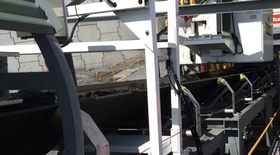Modular Belt Conveyors: The Ultimate Solution for Efficient Material Handling
In modern manufacturing and logistics, efficiency is key. One of the most effective tools for streamlining material handling processes is the modular belt conveyor. These advanced conveyor systems offer flexibility, durability, and efficiency, making them the preferred choice for industries such as food processing, pharmaceuticals, automotive, and packaging.
This article will explore what modular belt conveyors are, their benefits, how they compare to other conveyor systems, and why they are essential for businesses aiming to improve productivity. Additionally, we will answer frequently asked questions, provide a testimonial, and conclude with why investing in a modular belt conveyor is a smart decision.
What is a Modular Belt Conveyor?
A modular belt conveyor is a conveyor system that utilizes interlocking plastic modules to create a continuous conveying surface. Unlike traditional belt conveyors made of a single piece of fabric or rubber, modular belt conveyors are made up of small, replaceable segments that provide superior flexibility and durability.
These conveyors are commonly used in applications that require:
Hygienic and easy-to-clean surfaces (e.g., food and beverage industry)
Heavy-duty operations with high load capacity
Complex configurations, including curves and inclines
Long-term cost savings due to low maintenance and easy repairability
Benefits of Modular Belt Conveyors
Durability and Longevity
Modular belt conveyors are designed to withstand harsh environments, heavy loads, and frequent use without wearing out as quickly as traditional conveyor belts.Easy Maintenance and Repairs
Since modular belts consist of individual interlocking pieces, damaged sections can be easily replaced without having to replace the entire belt. This reduces downtime and maintenance costs.Flexibility in Design
These conveyors can be customized to include curves, inclines, declines, and multiple configurations, making them suitable for a wide range of applications.Hygienic and Easy to Clean
For industries like food processing and pharmaceuticals, hygiene is critical. Modular belts are resistant to bacteria growth, easy to clean, and comply with food safety regulations.Energy Efficiency
Due to their lightweight yet durable design, modular belt conveyors consume less energy, leading to cost savings in the long run.Slip-Resistant Surface
The modular belt’s textured surface provides better grip, preventing product slippage and ensuring smooth transportation of goods.
Applications of Modular Belt Conveyors
Modular belt conveyors are used in various industries, including:
Food and Beverage: Transporting packaged and unpackaged food items with strict hygiene requirements.
Pharmaceuticals: Handling medical products in cleanroom environments.
Automotive: Moving heavy parts efficiently.
Manufacturing & Assembly Lines: Streamlining production and packaging processes.
E-commerce & Warehousing: Automating material handling for faster distribution.
How Modular Belt Conveyors Compare to Other Conveyor Types
| Feature | Modular Belt Conveyor | Traditional Belt Conveyor | Roller Conveyor |
|---|---|---|---|
| Durability | High (Resistant to wear & tear) | Medium (Fabric belts degrade over time) | Medium (Rollers may wear out) |
| Maintenance | Easy (Replace individual modules) | Difficult (Entire belt replacement needed) | Moderate |
| Hygiene | Excellent (Easy to clean, bacteria-resistant) | Poor (Fabric belts absorb contaminants) | Moderate |
| Flexibility | High (Supports curves & inclines) | Limited (Straight or slightly inclined paths) | Limited |
| Energy Efficiency | High | Medium | High |
Frequently Asked Questions (FAQs)
1. How long do modular belt conveyors last?
With proper maintenance, modular belt conveyors can last for many years, often longer than traditional belt conveyors due to their replaceable modular components.
2. Are modular belt conveyors suitable for food processing?
Yes, they are widely used in food and beverage industries due to their hygienic design, easy cleaning, and compliance with food safety regulations.
3. Can modular belt conveyors handle heavy loads?
Yes, they are designed to carry heavy and bulky materials efficiently, making them ideal for manufacturing and industrial applications.
4. How do I maintain a modular belt conveyor?
Routine maintenance includes regular cleaning, checking for loose or damaged modules, and lubricating moving parts as necessary.
5. Are modular belt conveyors more expensive than traditional belt conveyors?
While the initial cost may be higher, modular belt conveyors offer long-term cost savings due to their durability, low maintenance, and easy repairs.
Testimonial
John D., Manufacturing Plant Manager
"We switched to modular belt conveyors for our production line, and it has been a game-changer. The ease of maintenance and durability have significantly reduced downtime, and our efficiency has improved dramatically. Highly recommended!"
Conclusion
Modular belt conveyors are a superior choice for industries looking to improve efficiency, durability, and hygiene in their material handling processes. Their innovative design, energy efficiency, and easy maintenance make them a valuable investment for businesses of all sizes. Whether you're in food processing, manufacturing, or e-commerce, a modular belt conveyor can streamline your operations and enhance productivity.
If you're considering upgrading your conveyor system, modular belt conveyors provide a reliable, cost-effective, and versatile solution.




Comments
Post a Comment